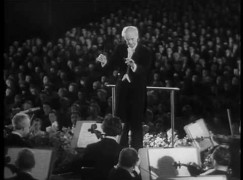The new releases I just chucked out
mainFrom the Lebrecht Album of the Week:
I chucked out a bunch of new releases this week, mostly solo recitals on esoteric instruments like the harp, the mandolin and the saxophone, though also viola, voice and harpsichord, some on so-called major labels. These recitals tend to be paid for by the soloist after a label decides they are uncommercial. Knowing that people are unlikely to buy it, why would I waste valuable time reviewing it and you reading about it? In these fragile times when every hour of life is doubly precious, artists need to think twice and think again before pushing out more and more of these promotional discs. The recycle bin is overflowing….
More here.
And here.
In Spanish.
In Czech.







A label decides they are uncommercial. Do they also decide that they are unmusical?
Virtually all CDs are paid for by the artists In the classical sector. Even DG takes a cut of future concert fees from some of their artists. The economic function of the CDA is to boost the artist’s prestige, thereby elevating future concert fees. In other words, virtually no classical CDs are commercial as such, and if you wish to think of them that way, it’s fair to say they’re all promotional. However, I would like to think that the artistic value of the a sustained statement in this format is still worth something despite the economic conditions we are in. All that is to say that the distinction you draw between so-called artist-funded disks and so-called commercial disks is a false one, and really it seems like you’re just guessing, based on your distaste for the solar repertoire of certain instruments you consider”arcane.”
I have to confess that I rather like Anglican dirges.
Might we know what you chucked into the bin?
I devoutly hope “chucked out” means redistributed. (The reference to the recycle bin is encouraging if not entirely clear). A reviewer of NL’s status must get a lot of discs he will never get to, through distaste or the simple logistics of there only being so much time he can spend and priorities as to what he will spend it on.
But what he dislikes may be music to the ears of others. I hope those discs went to Oxfam, or a local school or library, or some other deserving place where they might be circulated or even sold for a good cause to an interested ear. Or even to a second-hand music shop, if there still are such in the UK.
I find the notion that the harp, the mandolin and the saxophone are “esoteric” instruments to be idiosyncratic, at the very least. And students of viola, voice or harpsichord might well be interested to hear (and might have been interested to read about) the productions of someone who has got to the stage or recording in their instrument.
Sounds as if some musicians out there are doing everything they can to keep active musically. Some pay for the equipment to videocast their efforts. In better times, some rented venues and presented their own recitals so they could get out there and perform for people — I once heard a major opera singer in a Master class advise students to do exactly that to get themselves started.
I feel no disdain for musicians, even of those who play esoteric instruments, who currently have no access to orchestras, who manage to get themselves recorded by “major labels” so that their music can be in circulation. I must say I am surprised by the lack of sympathy for them. But there are only so many hours in the day. But one day someone may emerge and these discs may contain the hidden gem that launched a career…
I cannot agree with the attitude expressed about what is worth reviewing, perhaps because I do not accept the underlying premise about what the best purpose and function of reviewing is.
I thought the days of this strange bias against artist-paid-for releases, or other forms of subsidized classical releases, what I would term the “High Fidelity/Stereo Review/
Gramophone magazine” bias, was long since over. It should be. It was always wrong headed and was based on an erroneous belief that “papa [the big labels] knows best.” Translation: the big labels pay the freight. And they do but so what?
If there is to be a bias, perhaps the bias should be against “commercial” releases by the major labels, whether so-called major or otherwise. Being signed and issued by a big commercial label is not in itself reliable information about the worthiness of the repertoire or even the artists performing it — and even more crucially, it is absolutely unreliable information about the artists NOT signed or the repertoire NOT recorded.
What people are likely or unlikely to buy also tells you very little, unless you actually like the idea of shelves groaning with the weight of a Vivaldi “Four Seasons” collection. I do not dispute that event the latest “Four Seasons” warrants a review, but it is almost laughable to think that the sales of the disc have anything to do with the existence of, or content of, that review.
Sneering that artist-paid-for releases are sold in concert hall lobbies at intermission while commercial releases from major labels are sold at lavishly stocked record stores is over. I regret the absence of the stores to be sure, but I do not regret in the least my lobby purchases, nor the reviews I wrote of what were likely destined to be lobby purchases. And the available statistics about what is being bought and in what quantity never paid attention to those lobby sales anyway so for all we know vanity press classical outsold the big labels and maybe always did. The available statistics are created for the benefit of the big labels, period, and are gathered with that in mind. Not unlike some political polling by the way.
The commercial releases do not need your review, although the reviewer might enjoy getting the disc for free or getting a chance to hear it months or weeks before anyone else can.
I think it is now a purely reflexive gesture by the major labels to ship stuff out for review. If it is an artist, or a performance approach, or a piece of music that only a few dozen might be interested in, those dozen actually benefit from a review, if only to alert them to the disc’s existence, which I suspect is the primary function of most reviews anyway. And those dozen, in combinations of interests (instrumental/vocal/opera/historical reissue/modern/HIP) each with their own dozens, are what keep the magazines and for that matter, blogs, going for a minority (yet much-splintered) interest such as classical. I am not saying the only the esoteric warrants a review, but I am saying that the review of the esoteric is a very valuable review and the review that most justifies the reviewer’s time and effort and — most difficult of all – accumulation of knowledge.
Stated another way, deciding which Rebecca Clarke Viola Sonata CD to buy is a harder game than chess.
Does NL prefer his music exoteric?
CDs are an anachronism to begin with (just like DVDs)–and as the name of the blog ironically shows. With a few notable exceptions, the market tends to debase art–as Adorno noted long ago. Streaming allows all a forum where we can pick, choose, and discover. Artists and listeners become their own gate keepers.
Wait. We’re still making CDs? If your making a CD thinking it’s going to get “circulated”, you’re part of the problem. It’s soon to be 2021. Let’s get with the times, people.
I like CDs and DVDs. When my WiFi goes out (occasionally — it’s pretty reliable on the whole) I just pop one on.
I like audio cassettes, too.
Thing is, I already built up and paid for a large collection of all of them, which I am not disposed to “chuck out.” I have the means to play them. So I have little hesitation in adding to these collections occasionally if something tantalising catches my eye.
Well, you’re just plain wrong about classical cd sales. Buyers continue to support the cd format for classical music with a less than 5% reduction in sales over the past 3 years. Classical music cd sales account for 60% of music sold. Streaming is growing by 20% per year but still only accounts for 25% of music sales. LP’s account for less than 4% of music sales.
How do you know that “people are unlikely to buy it ” ? With all due respect, Nl, there is a palpable element of conceit about this thread, with reference to your valuable time . Can you play the harp ? Or for that matter, the viola or saxophone ?
Indeed, one can also ask what on earth persuades NL that a CD on the Cugate (who?) label is likely to be purchased by any more people than a subsidized disc released by, say, Chandos or Sony. Yes, the composer’s name might spur some sales, but there are many recordings of Pärt’s choral works out there, so what makes the new release especially destined for sales success?
I feel like this post and the related comments thread amounts to a net informational loss. Could someone in a position to know please post simply and clearly the facts as they relate to the typical classical release. To wit: Are they ALL artist-subsidized as alleged in a comment above? Are there some number of releases that are ENTIRELY paid for by the artist? Are there an additional few in which the label is happy to pay all costs to secure the signing of a major talent? Thanks in advance …
Yes, I am in the know and I will comment. That said, my comment only refers to my own company – I do not have total insights in other companies’ releases.
The typical release with us is recorded by us and paid for by us. There is a tiny minority of releases, which we have taken on, after the artist has offered up a Master to us, which has the required quality (very few manage that) and fits into our programme. I don’t like at all the notion, set out in the heading, that the typical (“tend to”) classical release is paid for by the artist, since that simply is not true (at least not in our case).
Almost all classical releases are uncommercial, if by that word one understands the ability to make a profit on a new release. In our case it is usually paid for by whatever the back catalogue (which in our case is huge) can bring in, long after the costs for those oldies have been written off.
And, finally, there is absolutely nothing to say that an artist-produced recording is bad and therefore not worthy of a review. We were offered the totally amazing Alkan recording with Paul Wee on a platter – and grabbed it fast; it went on to be short-listed for the Gramophone Award, was Editor’s choice, got Diapason d’Or and a lot of other plaudits. Paul now has started a major recording career with us, with his next album (double Thalberg) just out (and, yes, paid for by us), having already gotten glowing reviews. So there is no cause to disqualify a privately-made recording, because it is privately-paid for, as little as the fact that a label has paid for a recording guarantees sufficient quality. Ergo, recordings should be reviewed for what they show, not because someone assumes that it is a privately funded vanity record and therefore uninteresting.
Robert von Bahr, CEO, BIS Records
You are a prince for laying things out so transparently, sir! Thank you so much for the reply and information.
Re: “In our case it is usually paid for by whatever the back catalogue (which in our case is huge) can bring in, long after the costs for those oldies have been written off.”
Does that connote that some of your recent recordings, although unprofitable now, are expected to eventually turn a profit after a few decades (but presumably, you cannot be sure which ones)? If so, that sounds remarkably similar to the business model employed by some publishers of printed music (apparently, Strauss’s /Also Sprach Zarathustra/ was, until it went out of copyright at the end of 2019, the single biggest earner for Edition Peters, but Strauss was long dead when the piece attained such enormous profitability).
Dear SVM,
Yes.
Robert
I must confess that I would think of a solo recital CD of heckelphone, hurdy-gurdy, or baryton as being esoteric, rather than mandolin, saxophone, or viola. (All three together? Uff-da!)
No matter. Good music is good music.
Adolphe Sax is turning in his grave…